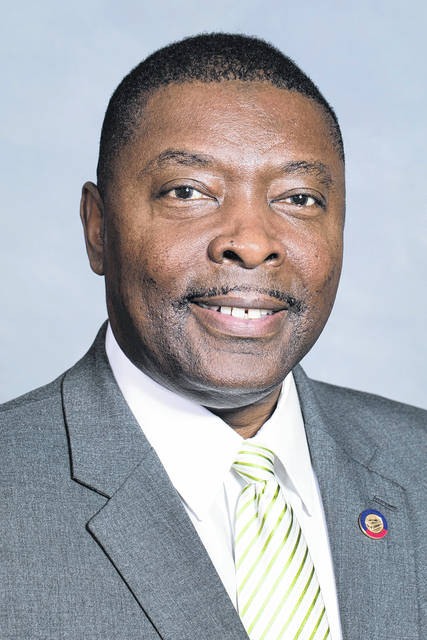As the state budget battle dragged on this week, local House Dist. 21 Rep. Raymond Smith Jr. urged patience from citizens as lawmakers attempt to negotiate through the impasse, and free up tens of millions of dollars earmarked for Sampson.
Last week, Gov. Roy Cooper and Democratic leaders offered up a compromise proposal they say accepts many features of the Republican conference budget — including all local projects — but removes corporate tax cuts and invests that money toward a stronger teacher pay raise.
The Republican conference budget included an average teacher pay raise of 3.8 percent, and Cooper’s budget included an average teacher pay raise of 9.1 percent, said Smith. The compromise proposal recommends an average 8.5 percent increase with a pay raise for every teacher. It also calls on lawmakers to expand Medicaid health care coverage for 500,000 to 600,000 North Carolinians.
All along, that proposed Medicaid expansion has proven a key sticking point.
Cooper insisted that Medicaid expansion must be included in part of any agreement, even though Senate Republicans remain strongly opposed to the idea. Negotiations won’t happen, according to Senate leader Phil Berger, unless the governor takes his “Medicaid ultimatum” off the table for budget talks.
Many GOP leaders, including local state Sen. Brent Jackson (R-Sampson), put out statements referring to Cooper’s “Medicaid ultimatum” blocking funding.
If no budget deal is reached in North Carolina there will not be a government shutdown. State spending will simply continue at current levels, but lawmakers said that would put project funding for Sampson up in the air.
Jackson said Sampson’s funding, as well as the funding for his other 10th district constituents in Johnston and Duplin counties, is now “uncertain” as “Cooper refuses to negotiate budget separately from Medicaid ultimatum.”
“It’s not right to block all this funding just because of one policy disagreement,” Jackson stated.
Smith, whose constituents are in Sampson and Wayne, said he is confident some middle ground can be reached, and called for “patience and support.”
“I urge the community to give the process of negotiating an opportunity to work,” said Smith. “I know that it has been years since this option was possible with a super-majority in the legislature. Notwithstanding the looming budget vote, the N.C. General Assembly has chosen to separate Medicaid expansion — N.C. Health Care for Working Families, HB 655 — from the budget. This places the veto vote on the budget as a standalone issue, with the exception of HB 655 being contingent upon the passing of a budget.”
“I am extremely confident that Democrats are prepared to compromise on the Republican version of Medicaid expansion that has a work requirement and insurance premiums,” said Smith, “even though it will be a tremendous hardship for people that only make $7.25 per hour.”
There is at least $20 million earmarked in the state budget for projects in Sampson County.
That includes $5 million in capital funding for Sampson Community College, $3.5 million toward a new Emergency Management Center; $1 million for water and sewer infrastructure; and $15,000 for exterior building and landscape improvements at Sampson County History Museum.
Also noted in the budget, $230,000 in funding was proposed for Tarheel ChalleNGe Academy for the construction of a multipurpose facility. Back in 2016, $700,000 was earmarked for the facility, which academy officials said would require a two-phase project totaling $1.4 million.
The governor’s budget, Smith stated, would further boost local funding by $4.6 million — $11.9 million to $16.5 million — for Sampson County Schools, and roughly $1.6 million — from $4.4 million to $6 million — for Clinton City Schools.
The additional funds in the compromise budget are due to the governor’s proposed $1.9 billion bond package for schools.
Smith called “a guaranteed revenue source,” as opposed to the Republican-led State Capital Infrastructure Fund (SCIF) proposal. However, Republicans maintain that, rather than take on new debt with a bond package, they would tweak the SCIF, created in 2017.
The pay-as-you-go alternative would devote more money to schools — $2.03 billion versus $1.9 billion — start projects two years earlier than a bond package would allow, and save North Carolina $1.2 billion in interest payments over the next 30 years, GOP leaders said.
Smith said that, while debt wouldn’t be incurred, the funding also wasn’t a certainty.
“While this plan does not incur debt, it is however, not a guaranteed source for school infrastructure funding,” Smith stated of the SCIF. “The problems with a SCIF are that in a recession, there will not be funds available to pull from other line items to fund the SCIF, which means some capital projects will not be completed. The other issue is that no one General Assembly can hold another General Assembly to this pay-as-you-go agreement. With a bond, the funding is guaranteed.”
Smith said the Republican budget includes around $400 million in corporate tax “giveaways,” and cuts $42 million from the Department of Health and Human Services, resulting in the loss of state jobs and services. He wants that to change as part of the negotiations.
He lauded the governor’s compromise budget proposal for including raises for all state employees and retirees as opposed to a 5 percent raise for only 27 percent of employees.. It also doubles the Republicans’ 1 percent proposed Cost of Living Allowance (COLA) for retirees to 2 percent.
“This budget does not provide adequate funding for our public schools; (and) it proposes a pay as-you-go plan that is an unstable and inconsistent source of funding, as opposed to a guaranteed bond which will ensure that our school systems infrastructure needs are met,” said Smith of the GOP plan. “There are numerous other problems with this budget that I sincerely believe that we can resolve with the opportunity to hold real budget negotiations.”

